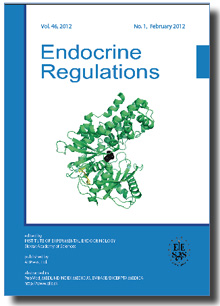Journal info
|
||
Select Journal
Journals
Bratislava Medical Journal Ekologia - Ecology Endocrine Regulations 2015 2014 2013 2012 2011 2010 2009 2008 2007 2006 2005 2004 2003 General Physiology and Biophysics Neoplasma Acta Virologica Studia Psychologica Cardiology Letters Psychológia a patopsych. dieťaťa Kovove Materialy-Metallic Materials Slovenská hudba 2025Webshop Cart
Your Cart is currently empty.
Info: Your browser does not accept cookies. To put products into your cart and purchase them you need to enable cookies.
Endocrine Regulations Vol.45, No.1, p.13-21, 2011 |
||
| Title: Gender specific influence of endogenous glutamate release on stress-induced fear in rats | ||
| Author: S. K. Jain, D. Zelena | ||
| Abstract: Objective. Stress, fear and anxiety are among major public health concerns. The role of glutamate in these processes is becoming more recognized with promising new drug targets. The aim of this study was to establish the gender specificity of a possible treatment of fear by glutamate antagonists in correspondence with changes in stress-hormone release. Methods. Footshock-induced fear was used as an anxiogenic situation in rats. A combination of two ionotrop receptor antagonists such as MK-801 (dizocilpine; 0.2 mg/kg) for NMDA (N-methyl-D-aspartic acid) and GYKI 52466 (benzodiazepine derivative; 10 mg/kg) for AMPA/kainate receptors were used for 5 days following the hypothesis that they potentiate each other the main action, but at the same time the side effects may be minimized. Results. Female rats tried to avoid the electrical stimulus more actively than males, as they spent more time with exploration and jumping and less time with freezing or rest. Ionotropic glutamate receptor antagonists have anxiolytic action. MK-801 was more effective in females, as it prevented the footshock-induced freezing per se, while in males it was effective only in combination with GyKI 52466. The locomotor side effect of MK-801 was not visible after repeated administration. The freezing behavior was positively correlated with the changes in prolactin but not with adrenocorticotropin levels. Conclusions. We proved the involvement of endogenous glutamate neurotransmission in stress-induced fear. Therapeutical usage may involve a combination of different receptor antagonists. Special attention should be paid to the gender, as females seem to be more sensitive, therefore they require smaller doses. During the treatment the prolactin levels should be monitored. |
||
| Keywords: MK-801, GyKI 52466, footshock, freezing, prolactin | ||
| Year: 2011, Volume: 45, Issue: 1 | Page From: 13, Page To: 21 | |
| doi:10.4149/endo_2011_01_13 |
||
|
Price:
18.00 €
|
||
|
|
||

